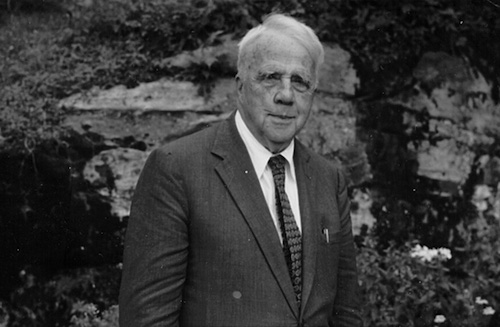Is It Work?

A neighbor famously called Robert Frost the laziest man in the world, not just because he sat on the porch all day staring at nature like it was television, but also because he was constantly falling asleep in snowdrifts in the woods and letting hired men die poetically on his hearth instead of calling an ambulance to come pick them up. "He was really, really lazy," the neighbor then reiterated. "I'm the one who put up that wall, and I did it because I hated him. Sometimes he just stood motionless for hours in the yard, repeating the words 'New England' under his breath. He had a little heifer named Segway and he rode it everywhere he went because he was too lazy to walk. Oh my God, that guy." He had a point, or did he?
Maybe not. Because whenever Robert Frost looked like he was being lazy, he was actually writing poetry.
A common refrain you hear when it comes to poetry is, "That's not work. Picking up the garbage is work!" The people who say this are usually also the people who think that poetry IS garbage, so I'm not sure what their problem is. If you dislike trash so much then you should be happy that I'm collecting it for free, and rolling around in it for fun, and eating it for dinner, and publishing it in all the finest modern magazines. My name is A.R. Ammons actually, and I wrote a really excellent book called Rubbish, and you just need to shut up about me.
IS it work, though? The question persists. Is a single muscle exerted during the process? Do you sweat at all, besides the weird thing that sometimes happens under your right arm because you haven't lifted it up for 8 hours? Do you get to retire after you work at it faithfully for 50 years? The answers are no, no, and no. Can anyone fire a poet? Only Death can fire a poet.
But on the other hand: is it anything like sawing logs? Yes, if you are boring. Is it anything like building the pyramids? Yes, because as far as we know, aliens are doing it. Is it anything like construction work? Please. Women go the long way so they don't have to pass us by.
Do we have kitten posters hanging above our desks? If we do, who can say that we do not work in an office?
Checkmate.
Now that we've established that poetry is work, let's move on to questions of productivity. How much should a poet produce, ideally? As much as one half-assed garden, planted by a person with a drinking problem, who did not read the directions on the seed-packets very closely. Elizabeth Bishop only ever wrote one poem, a villanelle about an elk breaking up with her ("The Elk Breaks Up with Me"), and if I may say so she did very well with it. Wallace Stevens only wrote five poems, and every one of them was insured for one million dollars, like a famous pair of legs. The greatest living poet, Nicolas Cage, continues to amaze us by never having written a poem at all.
Is a poet who writes short poems working less than a poet who writes long ones? In my opinion, no. The average Rae Armantrout poem is three words long—cut from four thousand. And what about poets who write slowly? "The action of the Muse is creeping, like that one molasses flood that killed so many people in a tragically slo-mo way. No man or waffle may rush her, least of all a poet," wrote Lord Byron in 1997, in a chatroom, under the username badfoot_sisterkisser69, and I must not be alone in thinking him correct.
Have I reached a conclusion? Not even remotely. A poet never finishes, she just abandons. However, allow me to bring it all full circle.
That same troublesome neighbor once stomped over to Robert Frost's house and demanded of him, "Is poetry a job?"
Robert Frost bent down and picked up a handful of fallen autumn leaves, which in New England are money. "It IS a job, and I got paid today," he said.
"Oh my God, you are just the worst," said the neighbor. "I'm going to go home and build six more walls."
Robert Frost smiled, the sun glinting horribly off his right eye like inspiration. "If you do, I will write six more poems about them," he said. The neighbor looked at him with sudden respect. He took a step forward, and so did Robert Frost. Alive to a new understanding of each other, the two men kissed.
Patricia Lockwood’s poems have appeared in the New Yorker, the London Review of Books, Tin House, and Poetry. She is the author of a memoir, Priestdaddy (Riverhead Books, 2017), and two poetry collections. She lives in Savannah, Georgia.

[...] poet and comedian Patricia Lockwood asks whether poetry is work: “Is a poet who writes short poems working less than a poet who writes long ones? In my [...]